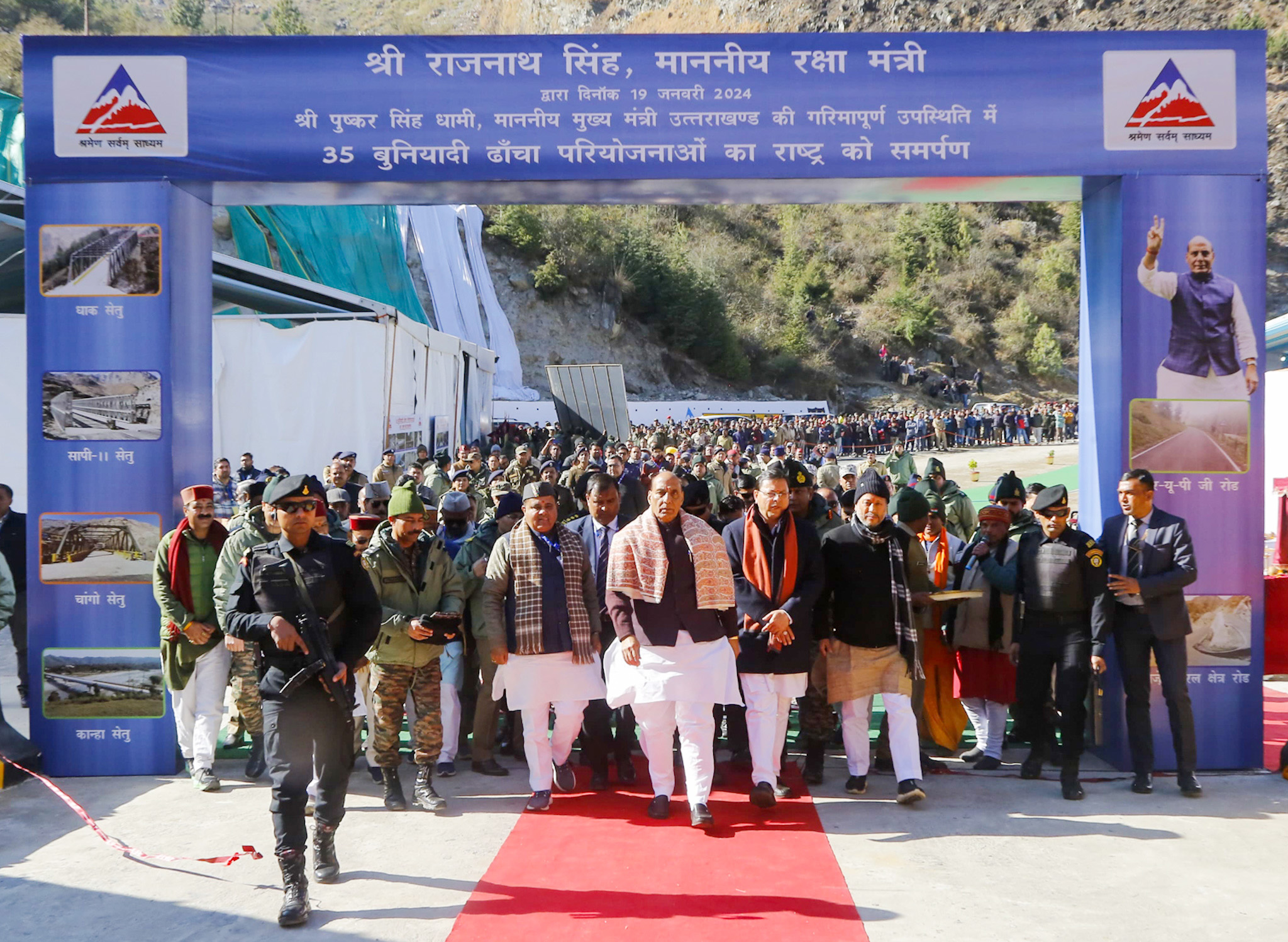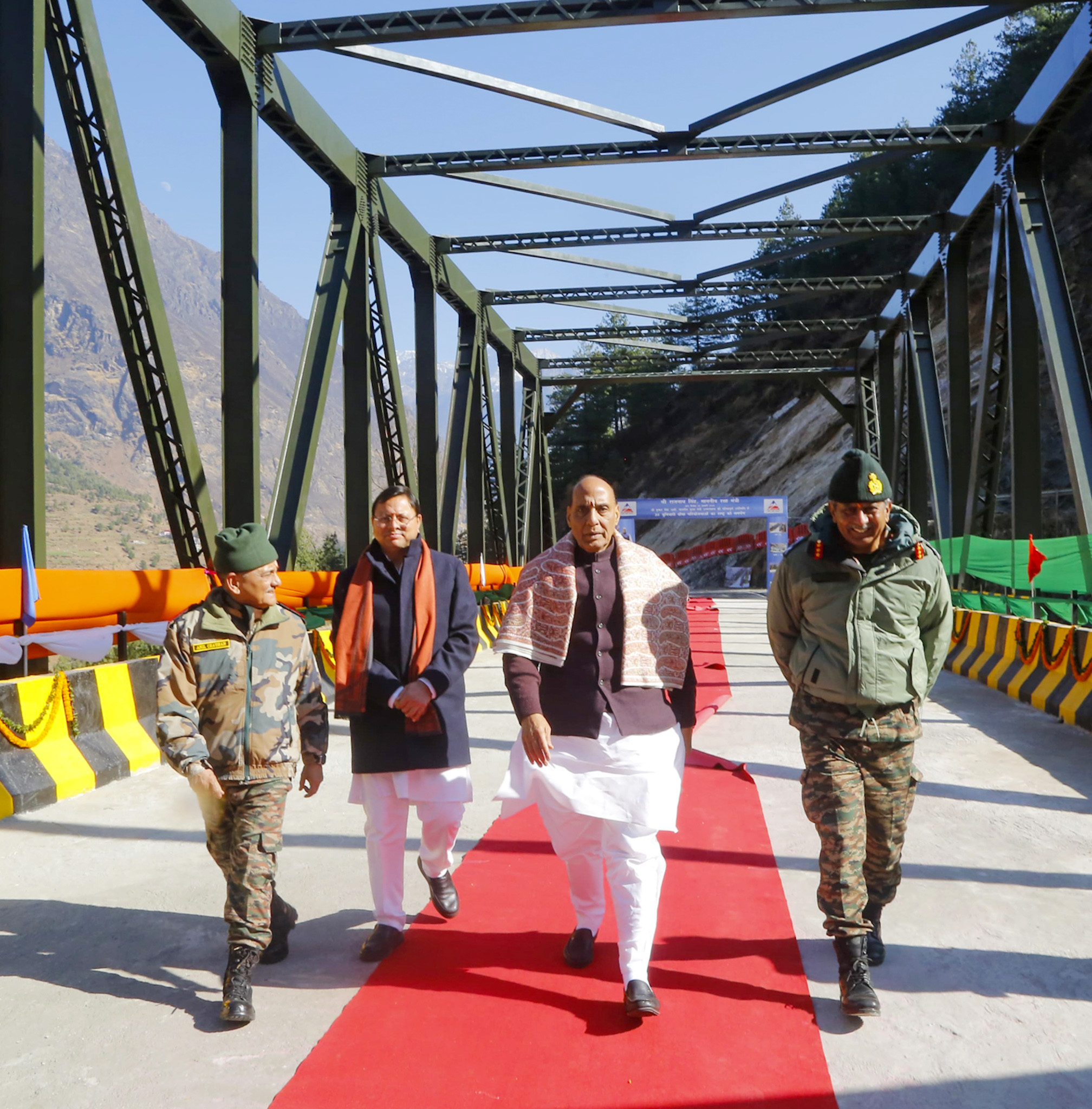
Union Minister for Defence Rajnath Singh during the inauguration of 35 infrastructure projects of Border Roads Organisation at Joshimath-Malari Road, in Uttarakhand today.
Joshi Math: Defence Minister Rajnath Singh dedicated to the nation 35 infrastructure projects of Border Roads Organisation (BRO), built at Rs 670 crore, during an event organised on the Dhak Bridge, a state-of-the-art 93-meter long Class 70R bridge over Dhak Nallah, which was inaugurated by Singh on the site at Joshimath-Malari Road today.
The Dhak bridge assumes strategic importance as it will provide increased connectivity to the borders and enhance the operational preparedness of the Armed Forces. It will also boost the socio-economic development of the region as it is the only road connecting villages from Joshimath to Nitipass. This will not only promote tourism but also generate more employment opportunities, the Minister said.
Out of the 35 projects inaugurated today, six are roads and 29 are bridges. Eleven of these bridges are in Jammu and Kashmir; nine in Ladakh; eight in Arunachal Pradesh; three in Uttarakhand; two in Sikkim; and one each in Mizoram and Himachal Pradesh.
34 projects were e-inaugurated by the Defence Minister. They included the Ragini-Ustad-Pharkian Gali Road in Jammu and Kashmir – a 38.25-km long CL-9 road, which will provide all-weather connectivity between Tangdhar and Keren sector, bolstering the operational readiness of the military.
“These projects were constructed under challenging weather conditions at the most inhospitable terrain,” the Ministry of Defence stated.
Singh commended the BRO for strengthening the border infrastructure of the country and asserted that by constructing roads, and bridges, the organisation was connecting the far-flung areas with the rest of the nation geographically, while also “linking the hearts” of the people residing in remote villages with the rest of the citizens.
He stressed that connectivity is being provided to every border area in the country through roads, bridges and tunnels, describing the work as not only of strategic importance but also pivotal for the welfare of the people residing in these regions. “People living near the borders are no less than soldiers. If a soldier protects the country by wearing a uniform, the residents of border areas are serving the motherland in their own way,” he said.
The Defence Minister referred to a change in approach of the present government with regard to border areas. He said unlike previous governments, which considered border areas as buffer zones between the plains and the potential adversary, the present government considers border areas a part of the mainstream and not a buffer zone. He added that the Government’s approach shows a new confidence in ‘New India’, which will not wait for potential adversaries to reach the plains to deal with them. “We are developing infrastructure on the mountains and deploying the troops on hill borders in such a way that it is ensuring the safety of the people there, and helping the military to effectively deal with our adversaries,” he said.
Referring to the large migration from border areas in Uttarakhand, Singh termed it as a matter of concern. He said the Prime Minister and the Chief Minister are taking the schemes related to infrastructure development to the last person as the aim is to cover the development journey from the seas to the borders.
The Minister also drew attention to the increasing number of natural disasters in some border States/UTs, including Uttarakhand, Ladakh, Himachal Pradesh and Sikkim in recent years, stating that many experts believe that climate change is the reason behind these incidents. He called climate change not just a weather-related phenomenon, but a very serious issue related to national security. “The Ministry of Defence is taking this very seriously and will seek cooperation from friendly countries in this regard,” he added.
– global bihari bureau






